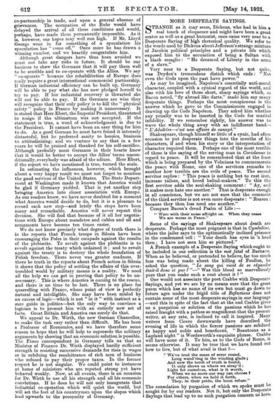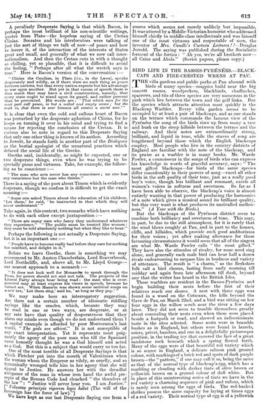- MORE DESPERATE' SAYINGS.
STRANGE as it may seem, Dickens, who had in him a real touch of eloquence and might have been a great orator as well as a great humorist, once came very near to a Desperate Saying of high rhetorical quality. We refer to the words used by Dickens about Jefferson's strange mixture of Jacobin political principles and a private life which exposed him to the accusation of being a Sultan with a black seraglio : " He dreamed of Liberty in the arms of a slave."
Very near to a Desperate Saying, but not quite, was Dryden's tremendous distich which ends : • Not even the Gods upon the past have power."
As may be imagined, Napoleon's essentially anti-moral character, coupled with a cynical regard of the world, and also with his love of those short, sharp sayings which, as Bacon noted, "fly abroad like darts," made him say many desperate things. Perhaps the most conspicuous is the answer which he gave to the Commissioners engaged in drawing up the Code Napoleon. They asked him whether any penalty was to be inserted in the Code for marital infidelity. If we remember rightly, his answer was to wave the whole thing away with an indifferent hand- " L'Adultlre--c'est une affairs de canapé." Shakespeare, though himself so little of a cynic, had often occasion to put desperate things into the mouths of his characters, if and when his story or the interpretation of character required them. Perhaps one of the most terrible of these is the saying of the serving man in Coriolanus in regard to peace. It will be remembered that at the feast which is being prepared by the Volscians to commemorate the peace with Rome, one of the servitors remarks to another how terrible are the evils of peace. The second servitor replies : " This peace is nothing but to rust iron, increase tailors, and breed ballad-makers." To this the first servitor adds the soul-shaking comment : " Ay, and it makes men hate one another." That is desperate enough in all conscience, but we are not sure that the comment of the third servitor is not even more desperate : " Reason : because they then less need one another."
Compare Bacon's dread Psalm of Life
Wars with their noise affright us. When they cease We are worse in Peace."
Some of the sayings of Shakespeare about death are desperate. Perhaps the most poignant is that in Cymbeline,, where the jailer says to the optimistically inclined prisoner in the condemned cell : " Your death has eyes in 'a head then ; I have not seen him so pictured."
A French example of a Desperate Saying which ought to be included in our collection is the mot fatal of Barnave. When as he believed, or pretended to believe, far too much fuss was being made about the killing of Foullon, he asked the question, " Le sang qui vient de as repandre itait-il done si pur ?"—" Was this blood so marvellously pure that you make such a rout about it ? " One would not associate the poet Crabbe with Desperate Sayings, and yet we are by no means sure that the great poem which has no name of its own but must go down to future ages under the frigid title of Reflections does not contain some of the most desperate sayings in our language —and this in spite of the fact that at the end Crabbe gives us a purgation or solution of the passions which he has raised fraught with a pathos so magnificent that the present writer, at any rate, is inclined to call it inspired. Many writers from Cicero downwards have described the evening of life in which the fiercer passions are subdued as happy and noble and beneficent. " Beauteous as a Lapland night " is Wordsworth's exquisite phrase. Crabbe will have none of it. To him, as to the Gods of Rome, it seems otherwise. It may be true that we have found out how to live, but of what avail is that ?—
We've trod the maze of error round, Long wand'ring in the winding glade g And now the torch of truth is found, It only shows us where we stray'd : Light for ourselves, what is it worth, When we no more our way can choose ! For others, when we hold it forth, They, in their pride, the boon refuse."
The consolation by purgation of which we spoke must be sought for by our readers. Not it, but only the Desperate Sayings that lead up to no such purgation concern us here. A peculiarly Desperate Saying is that which. Bacon, in perhaps the most brilliant of his non-scientific writings, quotes from Plato—the hopeless saying of the Cretan Clinias. Socrates and his interlocutors were talking of just the sort of things we talk of now—of peace and how to insure it, of the interaction of the interests of States great and small, and generally of what we now call inter- nationalism, And then the Cretan cuts in with a thought so chilling, yet so plausible, that it is difficult to avoid the feeling, Perhaps after all what the wretch says is true." Here is Bacon's version of the conversation :- " Clinias the Candian, in Plato [i.e., in the Laws], speaks desperately and wildly, as if there were no such thing as peace between nations, but that every nation expects but his advantage to war upon another. But yet in that excess of speech there is thus much that may have a civil construction, namely, that every state ought to stand upon its guard, and rather prevent than be prevented. His words are : That which men for the most part call peace, is but a naked and empty name ; but the truth is, that there is ever between all estates a secret war.'" It is clear that even the cold and callous heart of Bacon was perturbed by the desperate aphorism of Clinias, for he keeps on turning it over in his mind and trying to find a means for rejecting the conclusion of the Cretan. It is curious also to note in regard to this Desperate Saying that only one other thing is known of its author. According to Jowett, he stands forth in another part of the Dialogues as the bestial apologist of the unnatural practices which defaced the social life of the Greeks.
Goethe said, incidentally, as might be expected, one or two desperate things, even when he was trying to be specially pious and virtuous. Take, for example, the follow- ing as to conscience :- " The man who acts never has any conscience ; no ono has any conscience but the man who thinks."
There is a saying of the poet about Timon which is evidently desperate, though we confess it is difficult to get the exact meaning :— " Some one asked Timon about the education of his children. ` Lot them,' he said, ` be instructed in that which they will never understand.' " Take again, in this context, two remarks which have nothing to do with each other except juxtaposition :- "Them are many men who fancy they understand whatever they experience." ` The public must be treated like women : they must be told absolutely nothing but what they like to hear."
Perhaps the following is not actually a Desperate Saying, but it is an important one :— " People have to become really bad before they care for nothing but mischief, and delight in it."
Before we leave Goethe, there is something we may recommend to Mr. Austen Chamberlain, Lord Beaverbrook, Lord Northcliffe, and, above all, to Mr. Lloyd George— our nearest approach to a monarch :- " It does not look well for Monarchs to speak through the Press, for power should act and not talk. The projects of the Liberal Party always bear being read : the man who is over- powered may at least express his views in speech, because he cannot act. When Mazarin was shown some satirical songs on a new tax, ' Let them sing,' said he, ' as long as they pay.'
We may make here an interrogatory suggestion. Are there not a certain number of idiomatic riddling savings like the oracles, which, because they may be read in one or two ways, are desperate, or at any rate have that quality of desperateness that they alarm our minds even though we do not understand them ? A capital example is afforded by poor Montezuma's last words, " The gods are athirst." It is not susceptible of any exact interpretation. Yet it represents most poig- nantly the agony of the poor man who till the Spaniard came honestly thought he was a God himself and acted as a God. But this is a subject that would carry us too far. One of the most terrible of all Desperate Sayings is that which Fletcher put into the mouth of Valentinian when the woman whom the Emperor so vilely, so cruelly, and so tyrannically wronged tells him in her agony that she will appeal to Justice. He answers her with the dreadful arrogance of the man in whose iron hand the awful pre- cepts of the Roman Code had clenched " the thunders of the law " : " Justice will never hear you. I am Justice." [" Voluntas prinelpis vigorem legis habet (The will of the Sovereign has the force of law)."] We have kept as our last Desperate Saying one from a source which seems not merely unlikely but impossible. It was uttered by a Middle-Victorian humOrist who addressed himself chiefly to middle-class intellectuals and was himself one of the most virtuous and respectable of men, the inventor of ' Mrs. Caudle's Curtain Lectures !!—Douglas Jerrold. The saying was published during the Socialistic ferment of the forties : " Ali yes, we're all brotherh now— all Cains and Abels." (Soviet papers, please copy.)



































 Previous page
Previous page